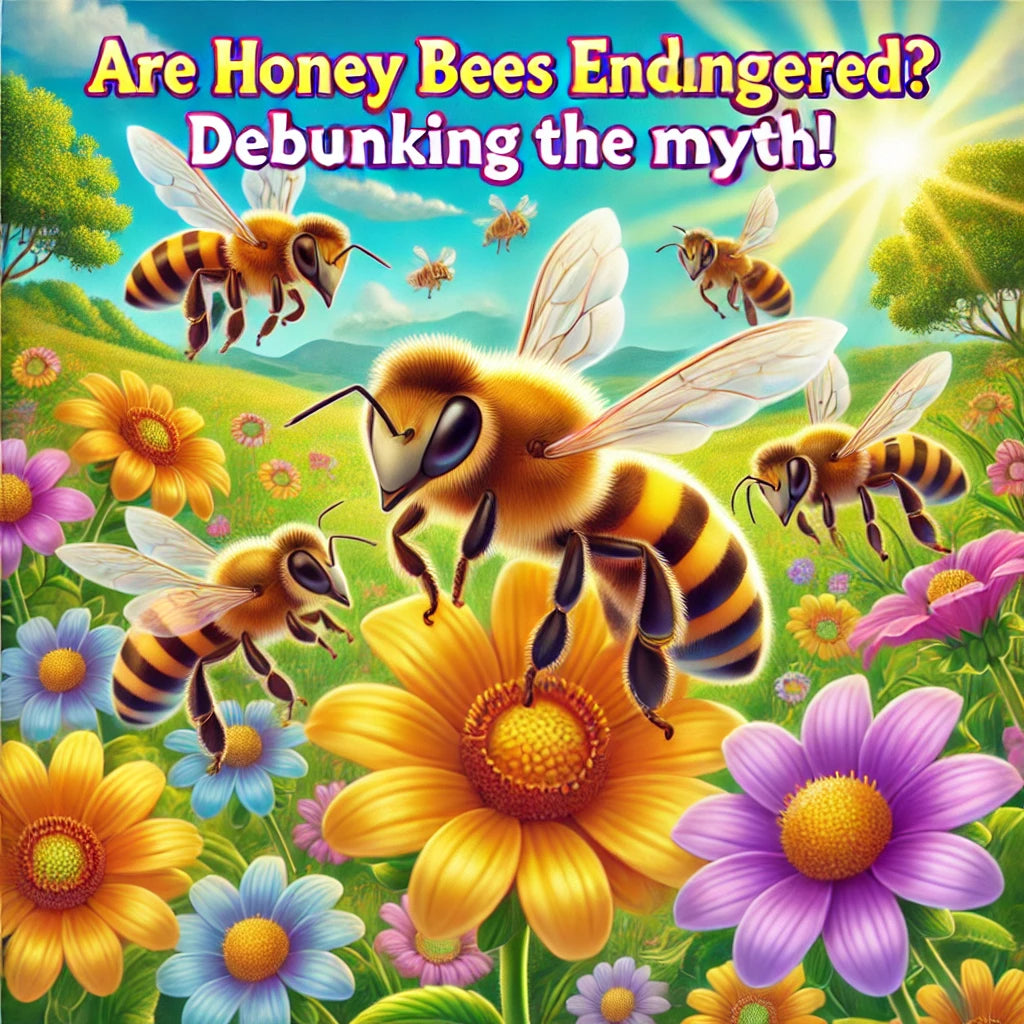The question of whether honey bees are endangered has been the subject of many debates. Despite reports suggesting that “bees are no longer endangered,” honey bees and other pollinators still face significant threats. These challenges impact both natural ecosystems and agriculture, which depends on bee pollination. In this article, we’ll explore the status of honey bees, uncover the benefits of bees to our environment, and debunk the myth that they’re “safe” from endangerment.
Understanding the Threats to Honey Bees
Honey bees encounter numerous challenges that threaten their survival. From habitat loss to pesticide exposure, they face a complex set of risks:
- Pesticide Exposure: Pesticides used in agriculture are harmful to bees, reducing their ability to gather food and weakening hive health.
- Loss of Habitat: With fewer flowering plants and natural spaces, bees lack the resources they need to thrive.
- Climate Change: Unpredictable weather patterns and rising temperatures disrupt the life cycle of bees and their foraging habits.
- Invasive Species: Predators and pests like the Varroa mite threaten hives, often leading to colony collapse.
These risks have created an unstable environment for honey bees, putting their populations at serious risk. While some may believe bees are no longer endangered, the reality is far more nuanced.
Debunking the Myth: “Bees No Longer Endangered”
The misconception that honey bees are no longer endangered likely stems from confusion over the different types of bees and temporary population recoveries in certain areas. Here are a few clarifying points:
- Managed vs. Wild Bees: Managed honey bee populations (those in hives maintained by beekeepers) may appear stable in numbers, but wild bee populations continue to decline. Wild bees vs. honey bees need different resources, and many wild species are endangered.
- Temporary Population Surges: Some years see temporary increases in bee populations due to favorable conditions, but these are often followed by sharp declines.
- Focus on the Global Picture: Although local populations may sometimes recover, the global decline in pollinators remains a serious concern for biodiversity and agriculture.
The Benefits of Honey Bees to Agriculture
Honey bees are essential to agriculture and food security, pollinating a vast variety of crops that humans and animals rely on. Here’s why honey bees are so vital to agriculture:
- Fruit and Vegetable Pollination: Honey bees contribute to the growth of over 90 crops, including apples, almonds, and blueberries.
- Economic Impact: Pollination services provided by honey bees are estimated to be worth billions of dollars annually.
- Support for Wildlife: Bees pollinate wild plants that serve as food and shelter for other animals, supporting entire ecosystems.
These benefits highlight the importance of keeping honey bees healthy and why any threats to their survival should be taken seriously.
How to Support Honey Bees
If you want to make a difference and support honey bee populations, here are some effective actions:
- Plant a Pollinator Garden: Include a variety of bee-friendly flowers that bloom at different times to provide year-round food.
- Use Bee-Safe Pesticides: Avoid using chemicals that harm bees. Look for organic alternatives where possible.
- Provide Fresh Water: Set up a shallow dish of water with stones for bees to safely land and drink.
- Encourage Bee Hive Relocation: If you have a hive on your property, consider bee hive relocation rather than extermination.
- Invest in Beetle Traps for Beehives: Support beekeepers by purchasing tools that protect hives from beetles and pests.
Supporting honey bees can start right in your backyard, and each of these actions contributes to a healthier environment for bees.
The Role of Beekeepers and Swarm Management
Beekeepers play a vital role in maintaining honey bee populations. Through careful hive management and the use of tools like bee trap attractants, they help prevent colony losses. Swarm management is also crucial; as hives grow, swarming occurs when part of the colony leaves with the queen to establish a new home.
Additionally, learning how to start a bee farm helps new beekeepers understand sustainable practices that protect and support bee health. Proper techniques in hive relocation, pest management, and seasonal care all contribute to bee preservation efforts.
Support Honey Bees with Swarm Commander
Despite the “bees no longer endangered” claims, honey bees and other pollinators continue to face risks that threaten their survival. Understanding their importance to agriculture, natural ecosystems, and biodiversity makes it clear why we need to debunk this myth and actively work to protect them. Whether you’re planting a pollinator garden, reducing pesticide use, or supporting local beekeepers, every effort counts in ensuring that honey bees can thrive.
If you're looking to protect honey bees in your area, Swarm Commander offers a range of products designed to help manage and support healthy bee colonies. Join the movement to safeguard honey bees and explore Swarm Commander’s tools to make a difference today.
Frequently Asked Questions About Whether Honey Bees Endangered
Q1. Are all bee species endangered?
No, but many wild bee species are at risk, while managed honey bee populations face significant challenges.
Q2. How do honey bees contribute to agriculture?
Honey bees pollinate crops essential to food production, supporting both human and animal food supplies.
Q3. Can individuals help honey bees in urban areas?
Absolutely. Planting pollinator-friendly flowers, providing water, and reducing pesticide use all help urban bee populations.
Q4. Why is there confusion about bees being endangered?
Mixed reports on managed and wild bees, along with temporary population surges, lead to misunderstandings about the status of bee populations.
Q5. How does climate change affect honey bees?
Climate change disrupts flowering patterns, foraging times, and habitats, making survival more challenging for honey bees.



